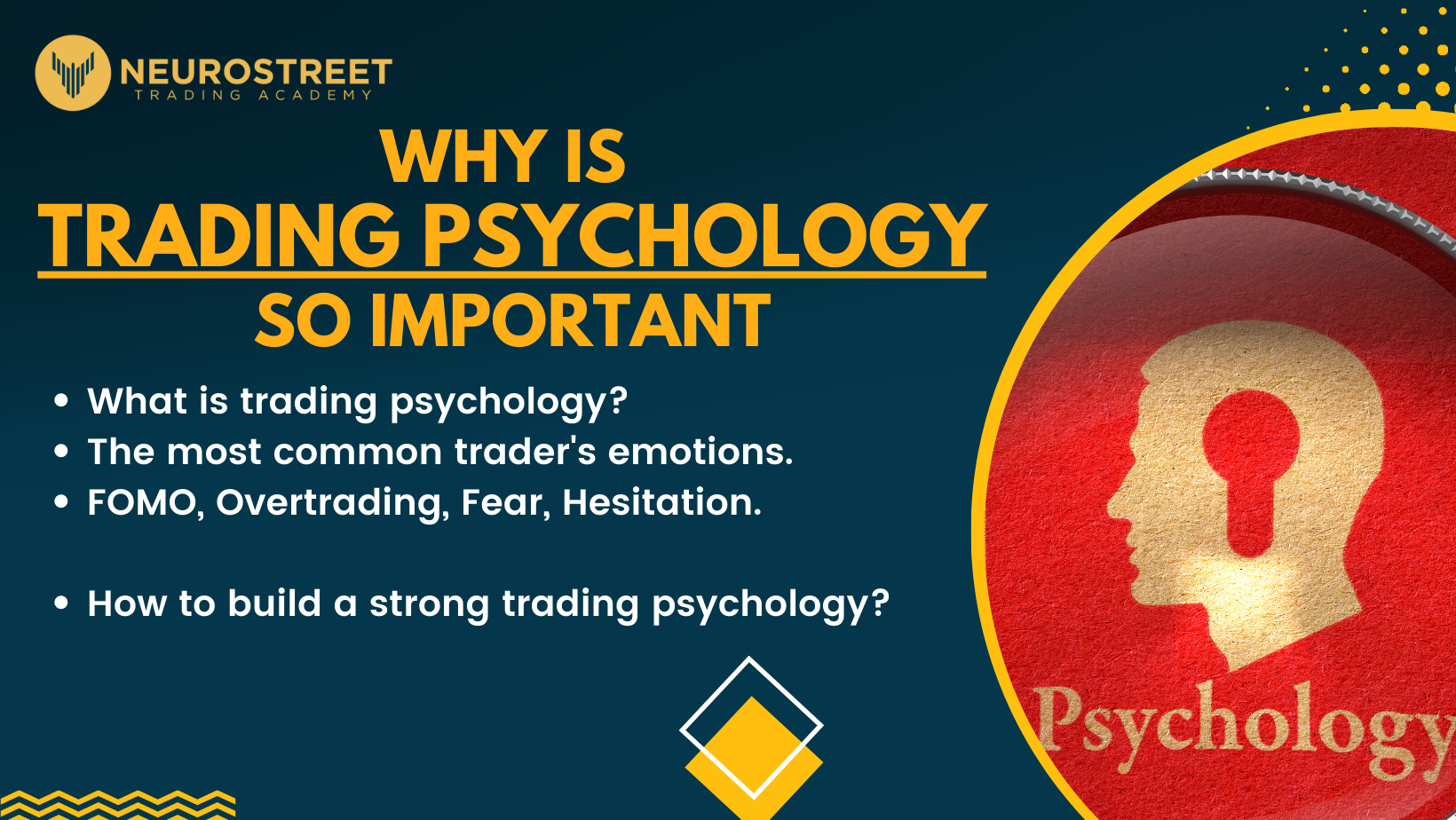Day trading any financial market can be a rollercoaster ride, filled with ups and downs. While it is true that a trader’s knowledge of market fundamentals and technical analysis is crucial to their success, trading psychology is perhaps the most important aspect of day trading.
Unfortunately, beginner traders do not realize this. All of their focus goes on learning how to be more effective in their technical analysis, which makes them neglect their emotional intelligence. But after some time, that unpreparedness catches up and a trader experiences a psychological breakdown when having a losing streak or blowing a trading account.
It is important that a trader is aware that trading psychology makes 80% of trading. So, let’s explore what trading psychology is.
What Is Trading Psychology?
Trading psychology encompasses the various mental and emotional factors that can impact a trader’s ability to make rational and informed trading decisions. It involves developing the mental fortitude to remain focused, disciplined, and objective in the face of market fluctuations, uncertainty and trading drawdowns.
At its core, trading psychology is concerned with understanding the cognitive biases, emotional responses, and behavioral tendencies that can influence a trader’s decision-making process. It involves developing strategies to manage these factors effectively, such as by setting clear trading rules, maintaining discipline, and practicing risk management.
One of the primary challenges that traders face when it comes to trading psychology is managing their emotions. Trading can be an intense and stressful activity, and it is common for traders to experience a range of emotions, including fear, anxiety, excitement, and greed. These emotions can lead to impulsive and irrational trading decisions, which can have a negative impact on a trader’s equity curve.
As a day trader, you will face several psychological challenges, such as FOMO, overtrading, doubt, fear, and hesitation. Let’s take a closer look at each of these challenges.
Fear of Missing Out (FOMO)
FOMO is a common psychological challenge that many traders face. It occurs when traders see other traders making money and they don’t want to miss out on the action. This can lead to impulsive trading decisions, such as buying into a stock or currency at the wrong time or chasing a trade after it has already passed. It is the feeling that a move will go without the trader being involved in it. FOMO can mostly occur when a trader is comparing himself to other traders, who are on a different journey and stage of their trading career.
To overcome FOMO, it is crucial to have a well-thought-out trading plan that you stick to. When you have a clear trading strategy, you are less likely to be confused by market fluctuations or what other traders are doing. By sticking to your trading plan, you can maintain discipline and reduce the impact of FOMO on your trading decisions.
Also – make sure to focus on yourself. Trading is a solo-business, so stop looking at what other traders are doing. Everyone is on their own.
Overtrading
Another psychological challenge that day traders face is overtrading. This occurs when traders make too many trades, either hoping to make quick profits or trying to catch up on past losses. Overtrading can lead to a complete lack of discipline and control over your emotions, which usually results in a detrimental trading loss.
To avoid overtrading, it is important to establish a trading plan and stick to it. Your trading plan should include guidelines for when to enter and exit a trade, the amount of money to risk on each trade, and the maximum number of trades you will make in a day. By following your trading plan, you can avoid making impulsive trades and maintain discipline.
Also – set daily trade limits. How many trades are you going to take per day/week? So when you take three to four losses in a row in a day – then just close your charts. It will help in the long term.
Doubt, Fear, and Hesitation
Doubt, fear, and hesitation are also significant psychological challenges for day traders. Doubt can lead traders to second-guess their trading decisions, causing them to miss out on potential profitable trade ideas. Fear can cause traders to hesitate, avoid taking trades, move their stop losses to breakeven too soon and pretty much – screw their trading performance.
To overcome doubt, fear, and hesitation, it is important to have confidence in your trading plan and your ability to execute it. By backtesting your strategy and gathering market data, you can gain the confidence you need to make educated and backed up by data trading decisions.
It is important to focus on consistency, rather than on making profit. Once a trader shifts their mindset towards performance and not results – their trading changes.
Developing a Strong Trading Psychology
To develop a strong trading psychology, you need to start by understanding your risk tolerance. This means assessing how much risk you are comfortable with and developing a strategy to manage it effectively.
You also need to establish clear trading rules and guidelines, including when to enter and exit trades, the amount of money to risk on each trade, and the maximum number of trades you will make in a day and also how much time will you spend on your charts.
In addition to having a clear trading plan, it is essential to maintain discipline and focus on long-term success rather than short-term gains. This will help you in avoiding those rushed decisions and FOMO to make money fast. If you give yourself a longer time horizon to succeed in trading, you have a high chance of success.
It is also important to manage your emotions effectively. This means being aware of your emotions and developing strategies to manage them, such as taking a break from trading when you are feeling stressed or anxious. You can also use tools like meditation or breathing exercises to help you manage your emotions and maintain focus during the trading day.
At NeuroStreet, we also teach Cognitive Performance, which you can check out on our website.
Traders, let us know what is the main psychological barrier you have as a trader, so that we can help you transcend those obstacles and turn you into a fully fledged profitable trader!


